
https://www.youtube.com/watch?v=Ul2MRZWnGCA
How Long Does Magnesium Stay in the Body

I want to talk about magnesium and how long it stays in your body .
Now there's certain minerals that go through the body pretty quickly , other minerals don't .
Like for example , sodium , iron and calcium tend to be retained in the body , but magnesium , potassium and zinc are not held very long .
Now what determines the retention or the recycling of potassium is how healthy your kidneys are .
If your kidneys are very , very healthy , you may only lose , you know , half of percent versus if they're very , very unhealthy , you will lose a lot more .
There's a huge gap on how much your body is gonna hold versus excrete .
And because the kidneys have the ability to get rid of excess magnesium , magnesium is rarely toxic to the body .
But you're gonna get rid of between 0.5 70% of your magnesium within a 24 hour period .
It's very important to keep the magnesium coming in the body .
The RDAs for a female for magnesium are between 310360 .
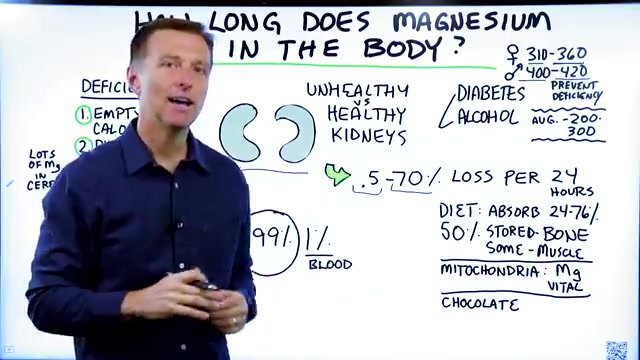
In a male , it's 400 to 420 .
But you have to realize the IRDAs are only there to prevent deficiencies .
They're not the dose that you'd should normally have to maintain a healthy body .
So these numbers should be a lot higher .
In fact , I think they should be at least 500 to 600 milligrams per day .
But the average American is only consuming between 2 to 300 milligrams per day .
Now if we also add in all the other diseases like for example , diabetes , the need for magnesium goes way way up because you simply do not retain magnesium if you have blood sugar problems .
Also , if you're drinking a lot of alcohol , that is going to severely decrease the ability to hold magnesium .

Now when you consume magnesium from the diet , you're only really absorbing between 24 to 76% of the magnesium from the food .
And that really , varies because if there's digestive damage in your colon , that could be a factor .
If there's a pH deficiency of hydrochloric acid in your stomach , that can also alter your absorption .
And there's other reasons as well .
About 50% of all the magnesium in your body is stored in your bone .
It's a reservoir .
So if you're not eating a lot of food with magnesium , your body will just pull it from the bone .
That could be a problem if you keep doing that , and some of it is stored in the muscle .
Probably the number one symptom of the magnesium deficiency is fatigue because your mitochondria , the energy factories of your cells need magnesium to create ATP , which is the energy currency of the body .

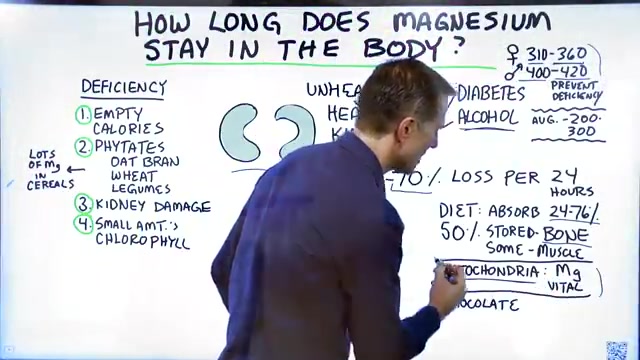
So we need magnesium for energy .
If you crave chocolate , you could be deficient because there's a lot of magnesium in chocolate and your body will tend to crave those things that have a certain nutrient that it's trying to pull in .
Also realize that 99% of all the magnesium in your body is inside the cell and only 1% is outside the cell .
So if you were to get a test for magnesium in your blood , you really would not get the accurate picture of what's going on .
You wanna get an intracellular test .
I'll put a link down below of a , a company that can test your your magnesium .
It's intracellular testing .
Why are you deficient in magnesium ?
Well , number 1 it's the empty calories .
If you're consuming refined foods that strip all the magnesium out , that's the number one reason why people are deficient in magnesium .
Just basically refined sugars , grains , things like that .
The next reason is they're consuming a lot of phytates .
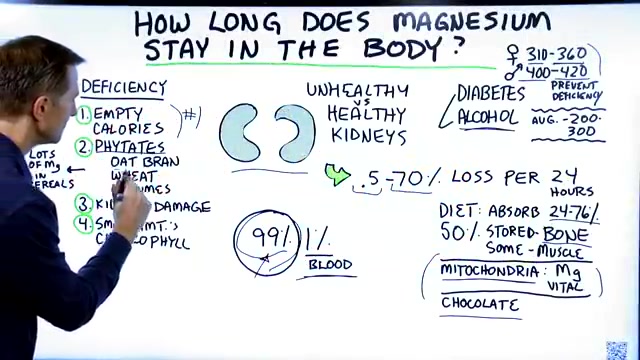
Phytates are located in the fiber of grains .
So if you eat a lot of oatmeal , which by the way has a good amount of magnesium , you're not gonna be able to absorb it because of the phytates .
Phytates bind the magnesium , and it will not let you absorb that magnesium .
So if you're consuming wheat products , other grains , legumes , they're all high in phytates .
And , typically whole , grain cereal has a good amount of magnesium , but it's loaded with Phytates .
So you're not getting the magnesium .
If you have kidney damage , that's gonna alter your ability to absorb magnesium .
Now you might say , well , I don't have kidney damage .
Well , did you realize that the number one cause of kidney damage is diabetes ?
And 90% of people that are prediabetic don't even know they're prediabetic .
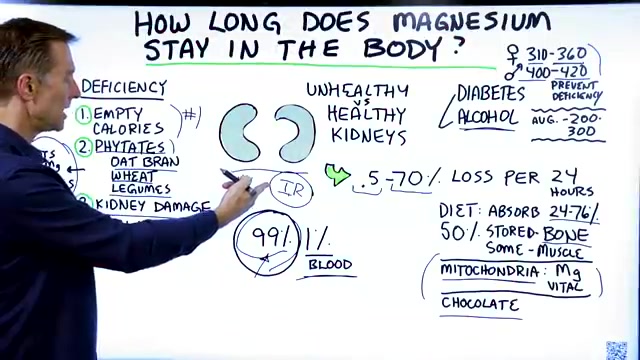
And probably 70% of the population has insulin resistance , which is a pre prediabetes situation .
And if you have insulin resistance , that not only could block , magnesium from be going in the body , but also over time it can lead to some kidney problems .
And the last reason why people are deficient is they don't consume enough chlorophyll type foods .
Chlorophyll at the center of it has magnesium .
It's similar to our blood chemistry where we have iron , but chlorophyll , it's like the blood of the plant .
So if you're not consuming a lot of vegetables and salads , that could be another common source of why you need more magnesium .
So one of the first symptoms you would get from a magnesium deficiency would be fatigue .
Another one would be a palpitation or your heart starts to go out of rhythm .
Your muscles feel weak , and there's quite a few symptoms .

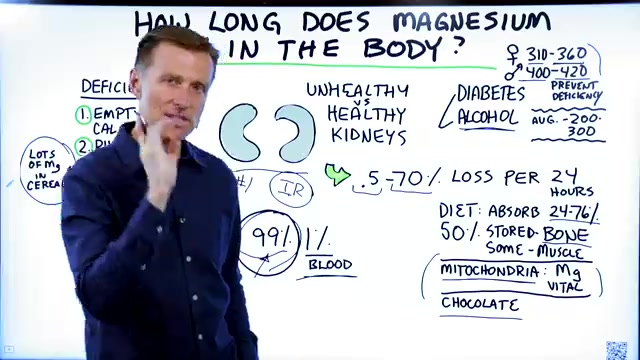
If you want more information about the symptoms of the magnesium deficiency , I put that video up right here .
Check it out .
Are you looking for a way to reach a wider audience and get more views on your videos?
Our innovative video to text transcribing service can help you do just that.
We provide accurate transcriptions of your videos along with visual content that will help you attract new viewers and keep them engaged. Plus, our data analytics and ad campaign tools can help you monetize your content and maximize your revenue.
Let's partner up and take your video content to the next level!
Contact us today to learn more.